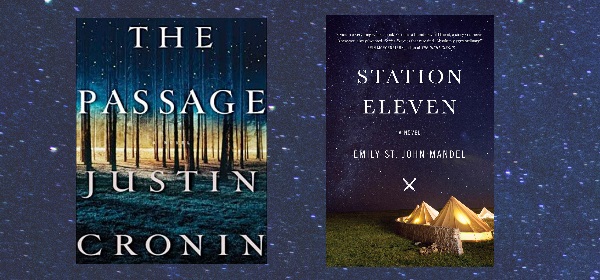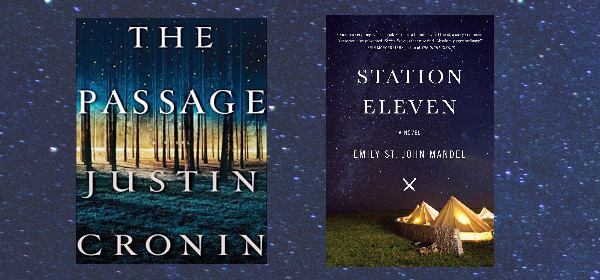Post-Apocalyptic Pairing: Station Eleven and The Passage

What does it mean to be human? In Station Eleven, Emily St. John suggests that our relationships to one another and the beauty that we share through art and literature elevate our lives beyond simple survival.
Station Eleven begins with the death of one man, a star actor who suffers a heart attack onstage. An EMT trainee from the audience rushes to his aid, and a child actress witnesses the scene. At the same time, a deadly flu has already begun spreading, and in a matter of weeks nearly all of the people on earth have died.
Twenty years later, small groups of humans are making new lives without the technology of the past--no internet, electricity, or automobiles. Kirsten, The former child actress who witnessed Arthur's death, roams as part of a Traveling Symphony who perform concerts and plays for small audiences. Their motto is a line from Star Trek: Voyager: "Because survival is insufficient."

Emily St. John Mandel
Mandel's novel is about survivors, and their efforts to rebuild human society, but it's also about the people who died, and the ways in which their actions and their art continue to ripple out to affect the living. In a narrative that moves between past and present, from one character's point of view to another's, readers gradually learn of the entangled connections that tie the characters to each other.
Station Eleven reminds us to appreciate the everyday miracles of our world—from lighted swimming pools and electric guitars to lightning fast communication with people around the world. There is danger and darkness in Mandel's vision of the future, but there is more good than bad, more hope than sadness, and the people who remain hold tightly to the most beautiful parts of the world that’s been lost.
After you've absorbed the dark beauty of Station Eleven, check out The Passage, by Justin Cronin. The Passage is referenced by one of the characters of Station Eleven, and Mandel names it in the acknowledgements.
In The Passage, Justin Cronin manages to combine the popular themes of vampires and the end of the world into something completely new and captivating. In a super secret facility in Colorado, the government is trying to develop a serum that will create super solders with rapid healing ability, and the test subjects are all death row inmates. What could possibly go wrong? After a facility breach, the population of the world is nearly wiped out by a virus that transforms many of its victims into nearly unrecognizable beings with thick skin, superhuman strength, and seeming immortality. Cronin brilliantly weaves vampire mythos into science, and creates complex, flawed characters that really resonated with me. The Passage is followed by The Twelve, and a third book will conclude the series next year.
The Passage would no doubt be a great read on its own, but I particularly enjoyed reading it and seeing the ways in which it may have inspired and influenced Mandel. Each address the question of what it means to be human, and beautifully illustrate the connectedness of human lives.













